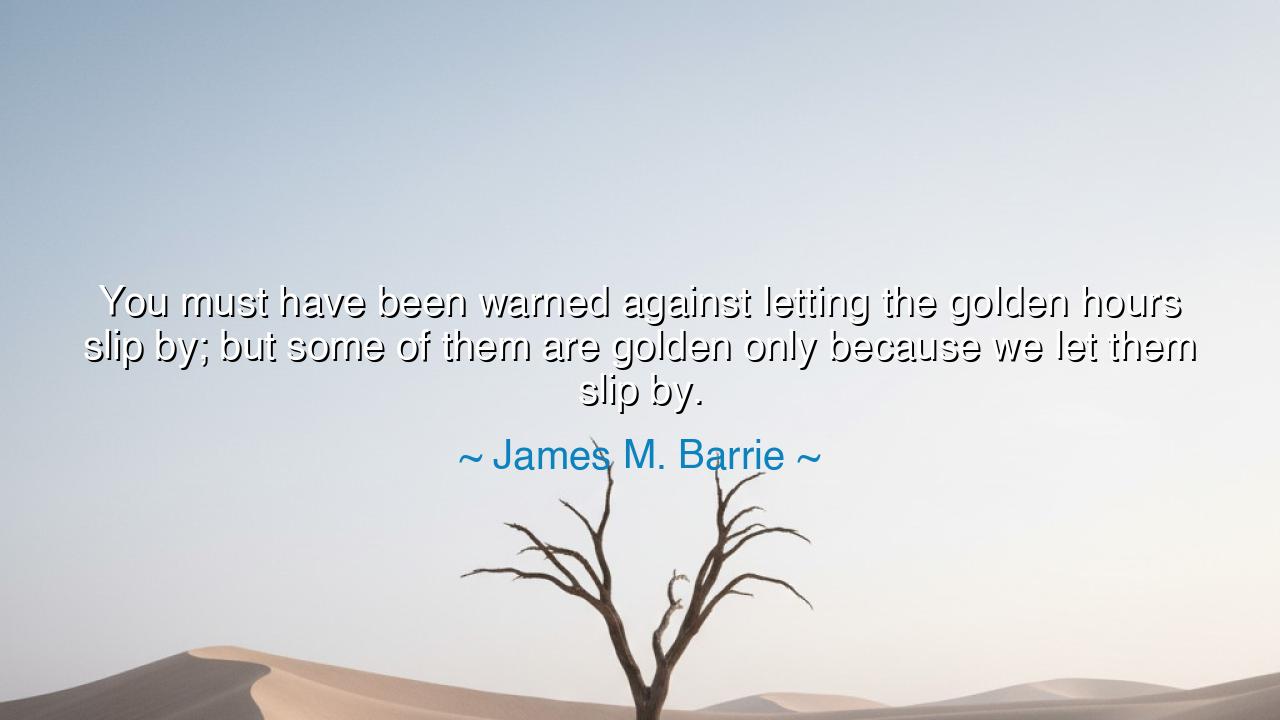
You must have been warned against letting the golden hours slip
You must have been warned against letting the golden hours slip by; but some of them are golden only because we let them slip by.






The teller of timeless stories, James M. Barrie, creator of Peter Pan and dreamer of eternal youth, once gave this paradox of life: “You must have been warned against letting the golden hours slip by; but some of them are golden only because we let them slip by.” At first, his words seem contradictory, as if he counsels us to treasure time while also permitting its waste. Yet within this paradox lies profound wisdom: not every moment is meant to be grasped, not every opportunity seized. Some hours become precious only because they were allowed to drift away, softened by memory and sanctified by the quiet passage of time.
The origin of this thought emerges from Barrie’s reflections on childhood, imagination, and the nature of life itself. He was a man who understood the tension between urgency and stillness. Society tells us always to use time, to seize it, to never waste it. Yet Barrie knew another truth: that idleness, rest, and gentle surrender are sometimes the very things that give time its gold. A golden hour is not always the one crammed with achievement; often it is the one in which we did nothing but breathe, daydream, or watch the sun sink beneath the horizon.
The ancients, too, carried this wisdom. The Greeks spoke of kairos, the right moment, distinct from chronos, the relentless ticking of the clock. Not every hour is meant for action—some are meant for contemplation, some for silence, some simply for being. The mystics of the East taught the same, that stillness itself is a kind of wisdom. To seize every hour is to live in strain, but to allow some to slip is to learn reverence for time as a mystery greater than our control. Thus, Barrie’s words echo what sages and poets across ages have whispered: time is sometimes most precious when it is not grasped.
History bears witness to this truth. Consider Albert Einstein, who often remarked that his greatest insights came not during feverish labor, but during idle hours of quiet thought, of sailing or daydreaming. The theories that shook the foundations of physics were born in golden hours he allowed to slip away from conventional work. Or think of Walt Whitman, the poet of America, who found his greatest verses not in haste but in long, unhurried walks, watching the world pass. These hours of seeming idleness became golden, not because they were conquered, but because they were surrendered.
The meaning of Barrie’s words, then, is both tender and liberating. We are so often told to “make the most of every moment” that we forget: not all moments must be conquered. Some moments are gifts precisely because they pass unmeasured. The laughter shared with a friend, the silence of a walk alone, the idle turning of thoughts in the mind—these are the golden hours that do not announce themselves at the time, but gleam in memory later, because we let them slip gently by.
Therefore, the lesson is clear: learn to balance action with surrender. Treasure the hours of labor, yes, but also the hours of rest. Do not measure all of life in terms of productivity, for what makes life beautiful is not only what we accomplish but what we allow ourselves to experience without striving. In this balance, we honor both the urgency of time and its quiet mystery.
In practice, I counsel this: carve out space in your life where nothing is demanded of you. Allow yourself idle hours without guilt. Watch a sunset, listen to silence, wander without aim. Let these hours slip by, for in slipping, they become golden. Then, when you look back, you will see not wasted time, but moments sanctified by their very passing.
Thus, remember the wisdom of James M. Barrie: “Some of the hours are golden only because we let them slip by.” Live fully, but also let life flow. For in the hours we surrender, as much as in the hours we seize, we discover the true richness of being alive.






AAdministratorAdministrator
Welcome, honored guests. Please leave a comment, we will respond soon